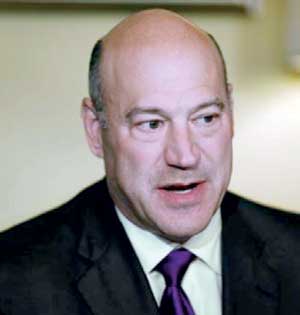Thursday Feb 19, 2026
Thursday Feb 19, 2026
Thursday, 8 March 2018 00:00 - - {{hitsCtrl.values.hits}}
Washington (Reuters): Gary Cohn, the top economic adviser to US President Donald Trump and a voice for Wall Street in the White House, said on Tuesday he would resign, a move that came after he lost a fight over Trump’s plans for hefty steel and aluminum import tariffs.
The departure of Cohn, director of the National Economic Council, was expected to be finalized in a few weeks and will blow a hole in Trump’s already depleted advisory team at a time when the economy is growing but markets are volatile.
Trump said in a tweet on Tuesday night that he “will be making a decision soon” on replacing Cohn. Administration officials said Peter Navarro, director of the White House National Trade Council, and conservative commentator Larry Kudlow were the “top two candidates” for the job.
White House officials said the tariffs dispute contributed to Cohn’s decision to leave but that it was not the sole reason. One official cited several issues and noted: “His biggest mission was on the tax cut bill, which he got passed.”
It was the latest in a series of high-profile departures from the White House, which Trump downplayed on Tuesday.
Asked at a news conference with the Swedish prime minister about high staff turnover, Trump said: “Many, many people want every single job. ... I could take any position in the White House and I’ll have a choice of the 10 top people having to do with that position. Everybody wants to be there.”
Cohn told Trump about his decision to resign on Tuesday, but he and the president had been discussing his possible departure for weeks, a White House official said.
Cohn did not show up for Trump’s news conference on Tuesday, despite a seat being set aside for him.
Following the news on Cohn, the U.S. dollar weakened and U.S. stock futures fell more than 1 percent, with analysts citing increased uncertainty about the U.S. economic agenda.
“One of the adults in the room has left. The markets will worry that this is a signal that we will definitely go ahead with these tariffs,” said Paul Mortimer-Lee, chief market economist at BNP Paribas corporate and investment banking.
Without Cohn in the picture, Navarro, an economist, will likely have a clearer field to pursue a protectionist agenda, which squares with Trump’s long-held concerns about trade.
Trump said last week he would impose import tariffs of 25% on steel and 10% on aluminum, a move criticized by some prominent Republicans, but backed by some Democrats. Trump’s announcement followed an intense debate within the White House between Cohn and Navarro and their respective allies, said White House officials.
“The chances of us having a trade war have now increased ... The economic nationalists now certainly have the upper hand,” said Monica de Bolle, a senior fellow at the Peterson Institute for International Economics, a think tank.
Cohn, 57, who served in the White House for a little more than a year, achieved an early rapport with Trump and proved influential in the administration’s decisions last April not to label China a currency manipulator and to renegotiate the North American Free Trade Agreement, instead of terminating it.